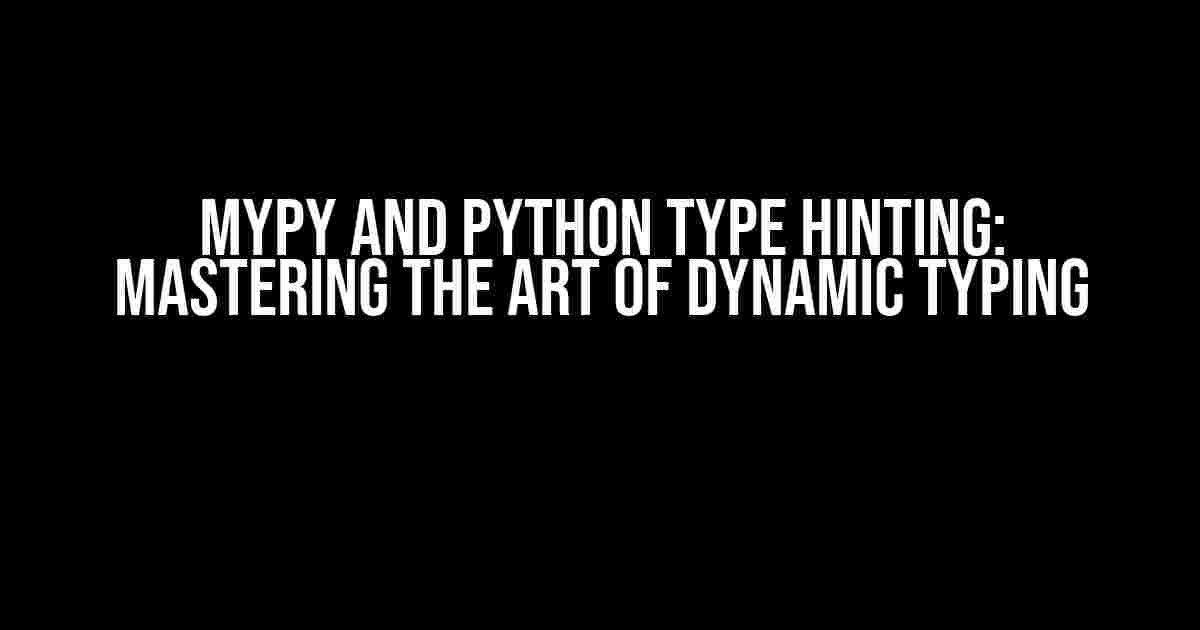Are you tired of dealing with type-related issues in your Python code? Do you want to take advantage of the benefits of static type checking without sacrificing the flexibility of dynamic typing? Look no further! In this comprehensive guide, we’ll delve into the world of mypy and Python type hinting, focusing on a crucial aspect: specifying type A from A|B at runtime.
Understanding mypy and Python Type Hinting
mypy is a static type checker for Python that helps you catch type-related errors before runtime. It’s an essential tool for maintaining code quality and readability. Type hinting, on the other hand, is a way to add type information to your Python code, making it easier for mypy (and other tools) to understand the expected behavior of your code.
When you write Python code, you’re working with dynamic typing, which means you can assign any type of value to a variable at runtime. While this flexibility is convenient, it can lead to errors that are difficult to catch. That’s where type hinting comes in.
The Power of Type Hinting
By adding type hints to your code, you’re providing a contract that specifies what type of value a variable, function parameter, or return type expects. This information is not enforced at runtime, but it’s used by mypy to perform static type checking.
def greet(name: str) -> None:
print(f"Hello, {name}!")
In this example, we’ve added type hints to the `greet` function, indicating that it takes a `str` parameter and returns `None`. This information helps mypy understand the expected behavior of the function, making it easier to catch type-related errors.
The Challenge of Dynamic Typing: Specifying Type A from A|B at Runtime
Now that we’ve covered the basics of mypy and Python type hinting, let’s tackle the main challenge: specifying type A from A|B at runtime. This scenario arises when you have a union type (e.g., `A|B`) and you need to determine which type is being used at runtime.
Here’s an example:
from typing import Union
def process_data(data: Union[str, int]) -> None:
if isinstance(data, str):
print("Processing string data")
else:
print("Processing integer data")
In this example, we’ve defined a `process_data` function that takes a `Union[str, int]` parameter. At runtime, we use the `isinstance` function to determine whether the `data` parameter is a `str` or an `int`. This approach works, but it’s not ideal, as it relies on runtime type checking rather than leveraging mypy’s static type checking capabilities.
Solving the Problem with the ` typing.TypeVar` Magic
To overcome the limitations of runtime type checking, we can use the `typing.TypeVar` mechanism to create a generic type that can be resolved at runtime.
from typing import TypeVar, Union
T = TypeVar("T", str, int)
def process_data(data: T) -> None:
if T == str:
print("Processing string data")
else:
print("Processing integer data")
By using the `TypeVar` mechanism, we’ve defined a generic type `T` that can be either `str` or `int`. This allows mypy to understand the type constraints at compile-time, while still enabling us to determine the actual type at runtime.
Advanced Techniques: Using ` typing.cast` and ` typing.get_type_hints`
In some cases, you might need to explicitly cast a value to a specific type or retrieve the type hints from a function or module. This is where the `typing.cast` and `typing.get_type_hints` functions come into play.
Casting with `typing.cast`
When you need to explicitly cast a value to a specific type, use the `typing.cast` function.
from typing import cast
def process_data(data: Union[str, int]) -> None:
if isinstance(data, str):
cast_str: str = cast(str, data)
print("Processing string data:", cast_str)
else:
cast_int: int = cast(int, data)
print("Processing integer data:", cast_int)
In this example, we use the `cast` function to explicitly cast the `data` parameter to either `str` or `int`, depending on the runtime type.
Retrieving Type Hints with `typing.get_type_hints`
To retrieve the type hints from a function or module, use the `typing.get_type_hints` function.
from typing import get_type_hints
def greet(name: str) -> None:
print(f"Hello, {name}!")
type_hints = get_type_hints(greet)
print(type_hints) # {'name': , 'return': NoneType}
In this example, we use the `get_type_hints` function to retrieve the type hints from the `greet` function, which returns a dictionary containing the type information for each parameter and the return type.
Best Practices for mypy and Python Type Hinting
To get the most out of mypy and Python type hinting, follow these best practices:
- Use type hints consistently throughout your codebase.
- Keep your type hints up-to-date and accurate.
- Use mypy regularly to catch type-related errors.
- Document your code with docstrings and type hints to improve readability.
- Avoid using `Any` as a type hint, as it defeats the purpose of static type checking.
Conclusion
In this comprehensive guide, we’ve explored the world of mypy and Python type hinting, focusing on the key challenge of specifying type A from A|B at runtime. By mastering the art of dynamic typing, you’ll be able to write more maintainable, efficient, and scalable code. Remember to leverage the power of type hinting, `typing.TypeVar`, `typing.cast`, and `typing.get_type_hints` to take your Python coding skills to the next level.
| Technique | Description |
|---|---|
| Type Hinting | Adding type information to your code to specify expected behavior. |
| mypy | A static type checker for Python that catches type-related errors before runtime. |
| typing.TypeVar | A mechanism for creating generic types that can be resolved at runtime. |
| typing.cast | A function for explicitly casting a value to a specific type. |
| typing.get_type_hints | A function for retrieving type hints from a function or module. |
By following the best practices and techniques outlined in this article, you’ll be well on your way to becoming a master of mypy and Python type hinting. Happy coding!
Frequently Asked Question
Are you struggling with mypy and Python type hinting? Worry no more! We’ve got you covered with these frequently asked questions and answers.
How do I specify type A from A|B at runtime?
You can’t directly specify the type of a variable at runtime using type hints. However, you can use the `isinstance()` function to check the type of an object and then use an if-else statement to perform different actions based on the type. For example: `if isinstance(obj, A): … elif isinstance(obj, B): …`
Can I use the ` typing.get_type_hints()` function to get the type of a variable at runtime?
No, the `typing.get_type_hints()` function returns the type hints of a function or module, not the type of a variable at runtime. It’s used by tools like mypy to statically analyze the code, but it doesn’t provide any information about the actual type of an object at runtime.
Is there a way to use a type guard function to narrow the type of a variable?
Yes, you can use a type guard function to narrow the type of a variable. A type guard function is a function that returns a type hint that is a subtype of the original type. For example: `def is_A(obj: A|B) -> TypeGuard[A]: …`. This function can be used to check if an object is of type A, and if it is, the type checker will narrow the type of the object to A.
Can I use the `cast()` function from the `typing` module to cast an object to a specific type?
Yes, you can use the `cast()` function to cast an object to a specific type. However, keep in mind that this is only a hint to the type checker and does not actually change the type of the object at runtime. For example: `from typing import cast; obj = cast(A, obj)`. This can be useful when you’re certain that an object is of a specific type, but the type checker can’t infer it.
What’s the best way to handle union types like A|B in mypy?
The best way to handle union types like A|B in mypy is to use if-else statements with isinstance() checks to narrow the type of the variable. Alternatively, you can use type guard functions to narrow the type of the variable. This approach provides more explicit control over the type checking and can help catch type-related errors at runtime.




